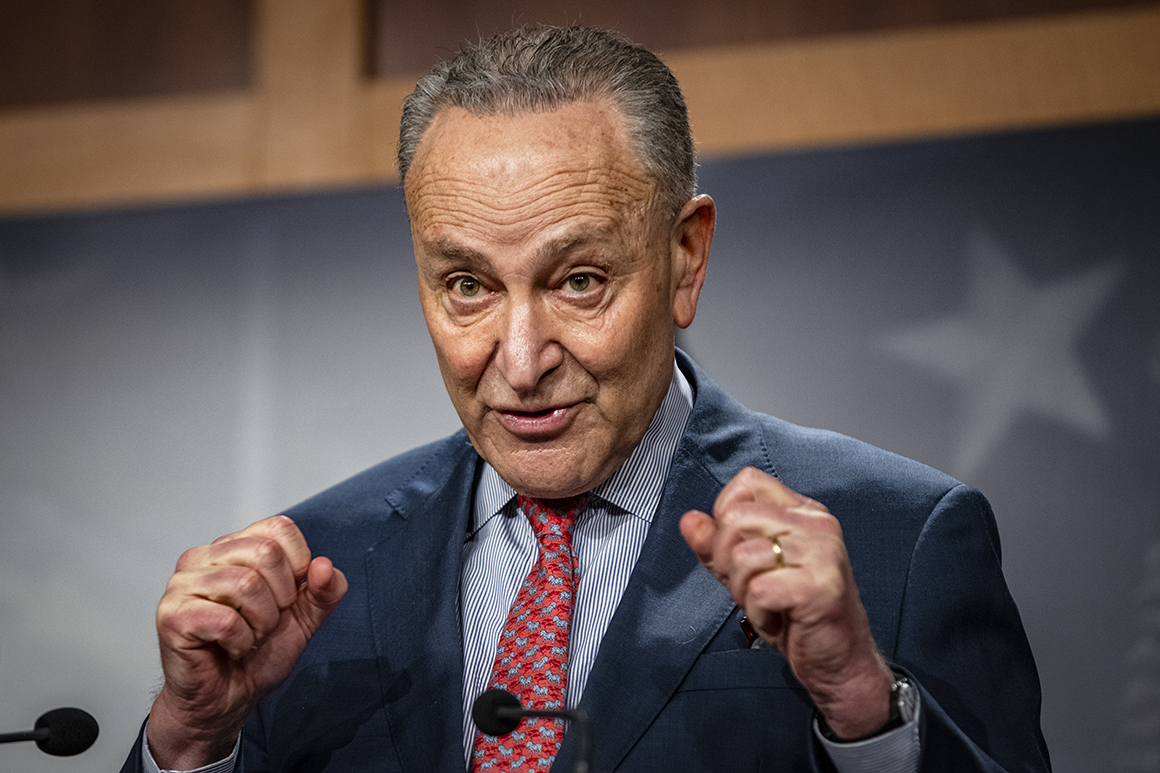The biggest items on Democrats’ agenda have almost no support from Republicans. Chuck Schumer’s campaign to counter China could be a different story.
The Senate majority leader is vowing to put a bill on the floor this spring aimed at curbing Beijing’s growing economic influence, human rights abuses and threats to U.S. national security. Schumer, a longtime China hawk, knows he needs Republicans to get his bill done. And while Senate Republicans were livid after Schumer pushed forward on a $1.9 trillion coronavirus relief package without GOP votes, they’re not closing the door to working with the New York Democrat on China.
“China has risen to the top of everybody’s list of concerns, but it really depends on whether they want to do something on a bipartisan basis or not,” said Sen. John Cornyn (R-Texas), who attended a recent White House meeting on semiconductors, a key point of tension between Washington and Beijing. “My hope is they do, because I think there is a bipartisan consensus that this is our biggest challenge as a country.”
The China issue is complex, melding economic policy with foreign affairs and national security. It’s also ripe for bipartisanship, despite the GOP’s broader beefs with Schumer: Lawmakers across the ideological spectrum agree that the U.S. should be doing more to push back on China’s malign behavior, including its theft of intellectual property and crackdowns on ethnic minorities.
Schumer’s effort seeks to check China while also boosting funding for certain U.S. manufacturers to help give domestic industries a competitive edge. The Democratic leader, who said he is “talking to the administration on a daily basis” about his measure, has long been more conservative than most of his party on China policy and sought unlikely alliances with Republicans on the issue.
“It’s hard to imagine a bill on China, the way it’s being discussed, that would not be bipartisan and enjoy broad support,” said Sen. Marco Rubio (R-Fla.). The vice chair of the Senate Intelligence Committee and a longtime China hawk, Rubio is also a potential 2024 presidential contender.
Senators who are helping steer the China legislation pointed to growing pressure for action on Capitol Hill. As top Biden administration officials prepare to meet with their Chinese counterparts in Alaska this week, Beijing is extending its reach beyond its borders, undermining democracy in Hong Kong and signaling a possible invasion of Taiwan.
“This is going to be the primary organizing paradigm for the United States and the world over the next few decades,” Sen. Chris Murphy (D-Conn.) said. “Republicans have been talking tough on China for the last year or so. This is an opportunity to give them an opportunity to actually put their votes where their mouths are.”
While bipartisan interest in legislation on U.S.-China relations remains strong, that doesn’t necessarily mean Republicans will support the final product.
“There is some bipartisan interest in that,” Senate Minority Leader Mitch McConnell told POLITICO when asked about Schumer’s push. “It will be interesting to see what form it takes.”
Some in the GOP are raising concerns about the price tag of creating new programs that benefit blue states. Republicans also want to ensure that there’s sufficient protection for intellectual property.
“The Democratic majority must resist the temptation to pile a long list of unrelated policy wishes into a big package and try to label it ‘China policy,’” McConnell said Wednesday, warning against an effort that would “delight liberal interest groups.”
And with several potential Republican presidential candidates already projecting a tough-on-China posture, the party might not want to cede the issue to Democrats, particularly after praising former President Donald Trump’s posture toward Chinese President Xi Jinping.
Schumer cautioned on Tuesday that Democrats have not yet decided on their next legislative push after a March spent confirming President Joe Biden’s Cabinet nominees. When the Senate returns from a brief recess in April, Democrats could decide to instead address immigration, given the migrant surge at the southern border.
In the meantime, Schumer has asked eight committee chairs to begin drafting provisions that could be included in a broader legislative package on China that’s modeled after a bill he shaped with Sen. Todd Young (R-Ind.). On Tuesday, Schumer brought up the issue on Democrats’ caucus call.
The majority leader’s growing interest in China comes as Democrats in both chambers crowd their to-do list with other items important to their base, including infrastructure, democracy reform and background checks for firearm purchases. But Schumer’s effort on China is durable enough to withstand political headwinds.
“Chuck Schumer has been talking the talk and walking the walk on China his entire career in the Senate. And [it was] no surprise to any of us when we elected him as leader that he would want to make China a priority,” Murphy said.
Proponents of the effort are optimistic that Congress can send a bill to Biden’s desk later this year, due in large part to the fact that so many lawmakers — from progressives to neoconservative hawks — see Beijing as a growing and long-term threat to American interests.
“There is strong, almost consensus-type support for bringing a China bill to the floor,” said Sen. Ben Cardin (D-Md.), a top Foreign Relations Committee member.
Sen. John Barrasso (R-Wyo.), another top member of that panel, described China as an enduring “strategic threat to us as a nation" and added: “I think it’s important to speak with a unified voice.”
Already, senators from both parties have proposed separate measures that could ride alongside the larger bill, including legislation to address shortages of semiconductors and to better compete with China in the 5G space. Some view the China bill as part of a broader effort to jump-start economic growth as the pandemic wears on.
“I think it’s a good companion with what the Biden administration may want to do on the economic recovery,” said Sen. Tim Kaine (D-Va.).
Among Democrats, there’s a sense that China was the one of the few areas where they weren’t completely at odds with Trump. Kaine said that “even if we had criticisms occasionally about Trump’s strategy on China, we didn’t criticize his motive. We thought, ‘He sees the challenge the right way.’”
That unexpected openness also extends to Republicans and Schumer. Sen. Kevin Cramer (R-N.D.) said Schumer “probably saw the threat sooner than a lot of others on the left,” and noted that the majority leader was “even complimentary of President Trump” on the issue. But “even unifying goals sometimes have disparate routes politically," Cramer added.
Republicans are already showing some signs of uneasiness about the direction Democrats are taking the China effort. Idaho Sen. Jim Risch, the top Republican on the Foreign Relations Committee, last week reintroduced his own China bill that has only GOP support. Risch declined to answer questions about his bill.
Senate Foreign Relations Chair Bob Menendez (D-N.J.) said Democrats are offering Risch an opportunity to engage, and “if they choose not to, that’s another story.”





















